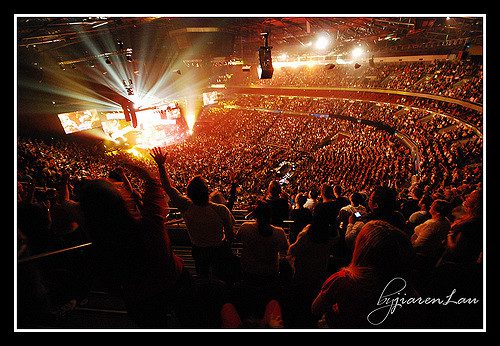There are a lot of articles and posts written by some great people who left the contemporary worship movement. That’s not my story, so this is not one of those posts. I grew up in a Southern Baptist megachurch in suburban Houston, Texas. I was surrounded by contemporary worship for the first 16 years of my life, but I never bought into the trend.
- I never joined because it always seemed superficial. It’s time for us to admit that you can only be taken in by the movement if you cannot live with the tension present in the world around us. As American Christians, our lack of vulnerability has led to a worship movement that is mostly about amusement, instead of necessity. But in trying to be entertaining, the church is shooting itself in the foot. Entertainment is always optional, and we will never beat TV and sports.
- I never joined because I resent the commercialism. As a younger person (and I’m stubbornly still counting myself in this category into my thirties), I’ve grown up in a demographic fiercely targeted by churches, as they try in vain to beat the odds and reverse the decline of cultural Christianity. To get us rascally millennials, church leaders have mistakenly believed that if they made church more like popular culture, we would like it more. But we don’t. The church’s attempts are lame, boring, and insulting. Now we’re leaving faster than ever. I don’t need an experience, I desperately need a community in which I’m nothing special. I don’t want to be hooked, I want to be befriended. I don’t want to be served, I want to serve with you. So just be the regular old church, with your regular old liturgies, and let us join in. Contemporary worship is the church’s underhanded marketing scheme, peddling commercial ugliness dressed up like the Crucified. Liturgy is the great alternative to the ugliness.
- I never joined because it comes from the wrong sources. The best of the church’s hymnody was written by pastors and theologians. It was crafted by poets and scholars. The result are texts of high quality. But the industry in its quest to be marketable only has room for marketable people who write marketable songs. It entrusts sacred storytelling to many with dubious credentials as artists, poets, or theologians.
- I never joined because I was never convinced that worship was about the musical part of the service. Most people in the contemporary worship movement claim to believe this, yet they keep calling the music part of a gathering the “worship,” those who lead music the “worship leaders,” and the music itself “worship music.”
- I never joined because the emotional manipulation was obvious. The contemporary worship movement uses music’s emotional power as an answer key to the great mystery of faith. The proof of God’s presence, it says, can be felt. But, as the late Rich Mullins would likely remind us, that’s not God’s presence, that’s only the kick-drum. This holy substitution should make us angry.
- I never joined because it’s about performance, instead of the work of the people. The contemporary worship movement is about hearing music and a message; historic worship is about Word and Sacrament.
- I never joined because it’s a passing fad. The beauty of historic Christian worship is that it is about things that last. By definition, what the contemporary worship movement produces is disposable. To be contemporary, you have to resign yourself to the reality that you will soon go out of style. So it is with the church’s worship.
- I never joined because the idea of preferential worship (or multiple worship “styles”) is toxic to a congregation. The idea of offering different worship formats, usually contemporary and traditional splits a church. It divides what should be the most unified exercise of the church, both physically and theologically. It also takes fundamental issues of meaning and makes them into mere issues of preference.
- I never joined because it’s inextricable from the seeker-sensitive movement, which undermines the purpose of gathered worship. Contemporary worship is often more about getting butts in the seats, and younger butts, at that. True worship is about doing God’s story so that it becomes our story.
- I never joined because it has limited use for artistry and beauty. The church once led the way in producing music of fine artistic quality. No longer. The contemporary worship movement is merely a derivative of mainstream pop music. Simply put, the contemporary worship movement produces christianized versions of commercial music genres. So not only is it derivative, but it’s derivative versions of music that largely ignores music as an art form.
- I never joined because the movement is driven by money. For God’s sake, it’s called the “worship industry.” To be successful, it must appeal to the lowest common denominator. It must create a need for itself. That’s how businesses work. And the contemporary worship industry does so by hooking us in on a purely sensory level, and then in worship, time and time again, we must seek to recreate the experience. We trade God’s story for a moment of fleeting excitement.
- I never joined because it turns music into a substitute sacrament. I always cringe when I hear a musician say that they are leading people into God’s presence. They may not know it, but the audacity of that statement is bold and telling. Music doesn’t connect people to God, the Holy Spirit does. And Jesus was clear when he said, “Here are my body and blood.” Music might be a special means of grace, but it’s not a means of special grace. If we use it to add dimension to liturgy, it works well, but if we rely on it to sustain us, we will always be let down.
- I never joined because the Christian faith isn’t lived in a vacuum. When we worship together, we aren’t only part of one community, but we’re identifying ourselves with the incredible story of the gospel, and joining the radical political movement begun by Christ himself. As we meet as God’s covenant people, the centuries of time collapse, and we find ourselves alongside the saints who have come before. In fact, we are joining the song of the angels, and twinkling along with the light of the morning stars, begun even before creation. And we are rehearsing for the unending hymn, the heavenly liturgy, which we will join one day.
I know there are some of you who left the contemporary worship movement. Or maybe you are like me, and you never crossed over. What was it about the movement that made you leave, or stay away to begin with?
Photo:
Flickr, creative commons 2.0















